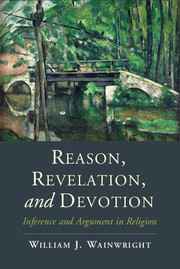Book contents
- Frontmatter
- Dedication
- Contents
- Acknowledgments
- Introduction
- 1 Four Examples of Religious Reasoning
- 2 The Purposes of Argument and the Person-Relativity of Proofs
- 3 Religious Reading and Theological Argument
- 4 Passional Reasoning
- 5 The Role of Rhetoric in Religious Argumentation
- 6 Reason, Revelation, and Religious Argumentation
- 7 Theology and Mystery
- Conclusion
- Notes
- Index
3 - Religious Reading and Theological Argument
Published online by Cambridge University Press: 05 December 2015
- Frontmatter
- Dedication
- Contents
- Acknowledgments
- Introduction
- 1 Four Examples of Religious Reasoning
- 2 The Purposes of Argument and the Person-Relativity of Proofs
- 3 Religious Reading and Theological Argument
- 4 Passional Reasoning
- 5 The Role of Rhetoric in Religious Argumentation
- 6 Reason, Revelation, and Religious Argumentation
- 7 Theology and Mystery
- Conclusion
- Notes
- Index
Summary
Anselm's Proslogion is not only cast in the form of a prayer, it is larded with passages from the Psalms and other portions of scripture. The two are connected. As Sr. Benedicta Ward notes, “when [Anselm] uses the language of the psalms, he is not quoting; he is speaking with the language of the scriptures.” Verses from the psalms “are woven together with Anselm's own thoughts, and are prayed spontaneously by him. This is the traditional monastic use of the psalter, where the words of the Hebrew psalms become the prayer of Christ.” As Alcuin wrote to Charlemagne, “if you come to the psalms with a serious mind, and look with the spirit of understanding, you will find there the word of the Lord incarnate, suffering, risen, and ascended.”
For Anselm and his fellow monks, reading, meditation, and prayer “were different aspects of the same thing, not separate exercises in their own right. Reading was an action of the whole person, by which the meaning of a text was absorbed, until it became a prayer. It was frequently compared to eating.” Thus Anselm's “Meditation on Human Redemption” opens with the words, “Taste the goodness of your Redeemer, burn with love for your Savior. Chew the honeycomb of his words, suck their flavor, which is more pleasing than honey, swallow their health-giving sweetness. Chew by thinking, suck by understanding, swallow by loving and rejoicing. Be happy in chewing, be grateful in sucking, delight in swallowing.” And indeed, “the text ‘O taste and see how gracious the Lord is’ was applied more often to the reading of the scriptures than to the Eucharist before the twelfth century.”
These views were by no means peculiar to Anselm. For example, Bernard's Thirty-Fifth Sermon on the Song of Songs says that the Bible is “the wine cellar of the Holy Spirit,” and calls it “a tasty matter for rumination that fattens his stomach, … and makes all his bones sing with praise…. And in the Vajracchedikasutra,” the Buddha says that “learning or teaching” one of its four-line verses “produces more merit than giving away whole world-systems filled with jewels.”
In short, the ingestion of religious texts was widely believed to be essential to spiritual development. These texts were not only transmitted by books or other physical instruments, however, but perhaps most often orally.
- Type
- Chapter
- Information
- Reason, Revelation, and DevotionInference and Argument in Religion, pp. 48 - 58Publisher: Cambridge University PressPrint publication year: 2015

